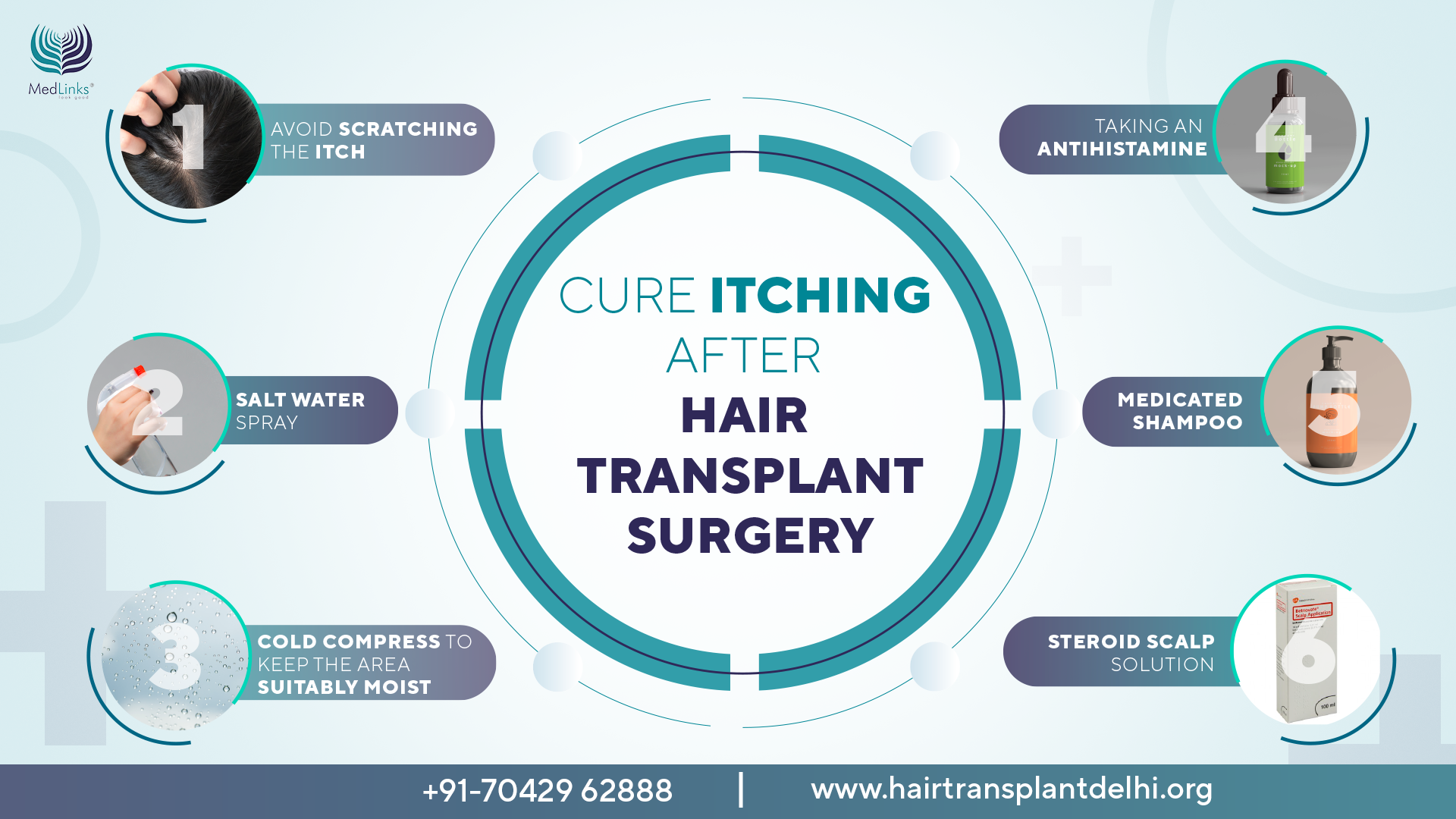
Hair transplant is a monumental aesthetic procedure for several individuals not only to enhance the appearance of the hairline and the density of hair on the scalp but to regain their lost confidence as well. Besides the actual surgery, most patients are also iffy about the itching that follows. It is a common consequence but an extremely uncomfortable one.
However, itching after a hair transplant is relatively common and is a body’s way of healing the scars and scabs that are remnants on the scalp. At MedLinks, you will get the best hair transplant treatment in India.
If you are worried about unwarranted hair scratches and constant itching, this article should answer all your questions.
Feel free to skip ahead if one topic catches your eye:
Hair transplantation involves making micro punctures or an incision on the donor site, followed by the recipient site. Although minimum, these scabs are nothing but the superficial wounds that your body heals over time.
Just after the procedure, the raw wounds, with the help of red and white blood cells, start the healing process. The wounds gradually shut themselves during the healing and form scabs that dry down and eventually cause itching.
The itching on the scalp predominantly starts once the scabs start falling off the scalps. It does take some time for your body to respond, especially after undergoing the hair transplant treatment.
In standard cases, the itching will be there for about a week and gradually fizzle down. However, in other cases, it can last up to four weeks until the wound has completely healed and the scab has fallen off the treated site.
Even if the itching gets worse, the last thing you want to do is vigorously itch the area. That is what makes the situation worse. You should never scratch the itch because by doing so you enhance the risks of further infections and allergies in the treatment area.
Besides the fact that your scalp is healing, there are a few reasons your scalp might be itching after the hair transplant procedure. Be assured that if you are feeling itching on the scalp, it is a sign of persistent healing. Right after the healing starts, the wounds on the scalp start to close off, and crusting starts.
Some of the common reasons why you are experiencing itching after a hair transplant are:
Crusting is the initial trigger to the itching after the hair transplantation surgery. Once the patient undergoes surgery, the wound starts healing with the help of red and white blood cells, forming a thin layer of protective skin covering, resulting in crusting. You will start witnessing crusting 2-3 days after the surgery, and it’s completely normal.
While crusting is a perfectly normal thing to happen, you need to refrain from scratching your scalp unnecessarily. Scratching not just reopens the wound; it also raises the risks of infection in the surgical site.
Your hair transplant surgeon will prescribe you topical medications to help with the itching and reduce your urge to scratch the site.
As weird as it sounds, even the regrowth of the hair from the transplanted follicles tends to cause itching. The transplanted hair will shed off after a month or two of the surgery, followed by new hair growth from the transplanted follicles. This is when the severe itching starts.
Not just the recipient site, the hair regrowth also happens around the donor site, leading to risks of further itching. Itching isn’t particularly prolonged in the donor site because all the hair follicles are removed.
However, since growth in the scalp does take some time, you can expect the itching to be on and off over some time.
Itching from an infection in the treated site is very uncommon. If you have undergone the top hair transplant in India under the best hair transplant surgeon, signs of infections are close to none. However, it is still possible in some cases where the patient doesn’t follow ideal aftercare instructions.
If you notice scabs after a hair transplant and try to scratch them, it can lead to infection too.
Besides that, not taking the prescribed medications also raises the risks of infections. Also, staying in unhygienic conditions with dirt and dust can increase the chances of infection.
Lastly, an allergic reaction can trigger heavy itching after a hair transplant surgery. This is common in patients who use random shampoo and conditioners that aren’t medicated. Your surgeon will prescribe you the right kind of medicated shampoo that you need to use. So, using anything besides that can put your scalp at unrest and cause allergic reactions.
| Also Read: Is One Hair Transplant Enough for a Lifetime? |
While itching is common after a hair transplant surgery, you can’t deny that it’s frustrating. The constant urge to scratch goes from bad to worse pretty quickly. However, that is where you need to step up and practice self-control.
Besides that, there are a few ways you can manage the scalp itch:
You need to follow every instruction that your hair transplant surgeon gives you. That itself should be enough to help with the healing and reduce the risks of uncontrolled itching.
| Also Read: How To Take Care of Hair After a Hair Transplant? |

When your hair transplant surgeon discusses aftercare and recovery, they will warn you about itching, crusting,and flaking of the skin. It is a perfectly normal consequence. However, everyone’s road to recovery is subjective, and certain situations can arise that need immediate medical intervention.
If you are experiencing:
You need to see a doctor immediately as these symptoms could mean a temporary setback to your recovery and should be assessed by your surgeon to rule out any future complications.
Despite everything, we understand that itching can be significantly frustrating. To have the constant urge to scratch on the wounds is pretty unsettling. However, if you want a quicker recovery without future complications, you need to refrain and let the body’s healing take its course.
At Medlinks, you will get the best hair transplant treatment in India; hair transplant surgeries using cutting-edge technology to meet the highest level of comfort and satisfaction with the treatment.
Itching after a hair transplant can last for a week, which can get uncomfortable and irritating. It can sometimes and rarely extend nearly three to four weeks completely subside. The reason is that you will not be able to wash your hair for a few days following a hair transplant surgery.
Itching can be commonly experienced at the donor and recipient zones two weeks after a hair transplant surgery that can last for a week or more. However, itching can be treated and managed with tips, such as
Itching after a hair transplant is common due to the following reasons.
Itching is a part of healing or recovery after a hair transplant surgery. The healing wound, stitches, staples, or skin glueing can cause itching and irritation as the process of healing, and cell reconstruction is underway.

Dr. Gaurang Krishna

Copyright © Medlinks. All Rights Reserved.
Disclaimer:The content published on this website(hairtransplantdelhi.org) is meant to spread awareness and educate the concerned patients regarding baldness and hair transplants as well as the treatment options available for baldness and hair transplant treatment in Delhi India. Any information on the website shall not be regarded as a prescription from a professional dermatologist. We recommend visiting a dermatologist in person for the right diagnosis and the treatment for any hair issues. We do not guarantee specific results as the treatments and the results vary from person to person.